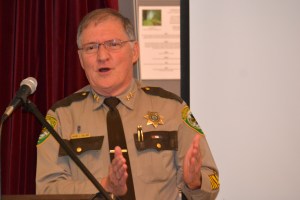PARIS — According a document handed out at the 15th annual alcohol and drug addiction conference Friday, 15 percent of Oxford Hills residents, or approximately 3,300 people, are active or potential alcoholics. And only three of every 100 or so will receive some treatment and only 33 will recover.
Event organizer William Stockwell said 34 people in recovery, that he knew of, were in attendance at the Basics of Alcoholism and Drug Addiction: Disease, Treatment and Recovery held at the First Congregational Church on East Main Street.
“In essence it’s a training for members of the community who deal with people who are addicted or alcoholic on a regular basis and have no idea what to do with them,” Stockwell said. “A lot of the things we’re talking about here are never discussed in recovery meetings — 12-step meetings — because that’s not what they’re there for.”
Stockwell said the purpose of the annual conference is to help educate people about the recovery process, starting with helping them gain an understanding about the disease of addiction and to break down the stigma that surrounds it.
“Most normal people out there look down on people who drink or take drugs, but as we’ve heard here, there’s a reason why people, after they take a few, they want more, and in 15 percent of the population — I’ve got to have more. More food, more sex, more drugs, more beer,” Stockwell said.
Attendees heard about groups and resources available to help addicts and families. Several presenters, who asked the Sun Journal to respect their anonymity with regards to their 12-step groups, spoke on behalf of their organizations, explaining how different programs could help.
“I thought life was good, that nobody knew we had a problem,” one speaker said as she described the benefit of Al Anon for friends and family members of alcoholics.
Much of the focus of conversation at the conference was centered around personal responsibility and spirituality — not to be confused with religion.
Paraphrasing a quote she’d heard before, the Al Anon speaker said, “Religion is for people who are afraid of going to hell. Spirituality is for people who have been there.”
Oxford County Sheriff Wayne Gallant shared his views on how drug and alcohol addiction have shaped law enforcement over the years. He said his views began changing in 1988 when he became involved in Drug Abuse Resistance Education, or D.A.R.E. He spoke about the opiate and heroin problem in Oxford County.
“Just in Oxford County in the last year, we have had nine people die from an opiate overdose,” he said. “It’s heart wrenching. This was somebody’s child, somebody’s mother, somebody’s father.”
Gallant pledged to have Narcan, a medication that can stop or reverse the effects of an opioid overdose, in the Oxford County cruisers.
“People didn’t get up in the morning and say, I want to be an addict,” Gallant said. “People didn’t get up in the morning and say, I don’t know, I want to be drunk all the time. It’s a disease and we have to treat it as a disease. We still have to arrest people, don’t get me wrong. . . . There are those who have to be incarcerated.”
Gallant said his focus is removing the drug traffickers from the streets, and finding help for people who need it. He said all of the arrests his department has been making in the past several months have been people from out of the Oxford Hills area, and often from out of state. Gallant said the best way to combat the problem is by coming together to work toward a common goal.
“We need the entire community to come together to help solve and resolve these problems,” the sheriff said. “There’s strength in numbers, and if we’re going to change this epidemic that’s going around right now, then it’s going to be the strength in the numbers. It’s going to be a collaborative effort by everybody from law enforcement, to medicine, to social working, to everyday citizens to help change the direction people are going in.”
Maine Superior Court Justice Lance Walker told the crowd that punishment of addicts is not the answer.
“We can’t arrest our way out of this problem . . . We can’t prosecute our way out of this problem,” he said. “We can’t jail our way out of this problem. And that’s not a realization that’s new to people who work in and around addiction, but it is new, I submit, to folks generally who haven’t been as touched by those issues as all of us have. That’s changing, and I see that as a big step forward,” he said.
The conference welcomed about a dozen speakers, including addicts in long-term recovery and mental health professionals.

Comments are no longer available on this story